VIPsight - March 2011
COMPANIES
German stock exchange and NYSE merge
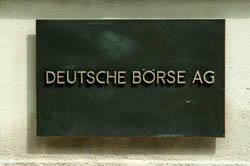 If the merger runs according to plan, by the end of 2011 the New York Stock Exchange (NYSE) Euronext and Deutsche Börse will merge to become the largest player in the global stock markets. As Deutsche Börse announced in mid-February, a global leader in derivatives trading and risk management, and the best-known and largest stock exchange for equity placements and trading, would be created. The new company would have sales of 4.1 billion euros and an EBITDA of 2.1 billion euros, said the Frankfurt stock-exchange operator. Formally, the NYSE is making a takeover bid for Deutsche Börse. Both companies will then be brought together under the umbrella of a new Dutch holding company and listed on the stock exchanges in Frankfurt, New York and Paris. It is envisaged that the new company will have two headquarters, one in the Frankfurt Green Tower and one on New York's Wall Street. The legal domicile of the holding company will be in Amsterdam. Other business sectors and executives will be located In Paris, Luxembourg and London. The new group will be led by a 17-member Governing Board. The head of Deutsche Börse, Reto Francioni, will lead the body as chairman, and his counterpart Duncan Niederauer will sit on it as CEO. Nine of the remaining Directors will then be determined by Deutsche Börse and the remaining six by NYSE Euronext. Niederauer will also head the Executive Committee, which will be composed of equal numbers of German and American members, as Chief Executive Officer (CEO), and thus be in charge of business operations. However, it was announced that these agreements to fill the bodies apply only until 2015. Thereafter, there should no longer be proportional representation rules for the structure. The merger is expected to bring annual synergies in IT, clearing and market operations as well as in management of around €300 million, and additional revenue synergies of €100 million. Observers expect that the trading system Xetra will also fall victim to the merger, as in future there should only be a single order book. While NYSE shareholders are to be offered an exchange of shares in the ratio of one old share for 0.47 new shares, the German exchange's shareholders can exchange their papers one to one. Thus, Deutsche Börse shareholders will hold 60 percent of the shares of the new company and the NYSE's shareholders the remaining 40 percent. Observers warn, however, that since only 17 percent of the shares of Deutsche Börse are actually held by German investors, and almost two thirds of the remaining shares are in the hands of Anglo-Saxon shareholders, the American and British owners will in fact form the majority in the new company. Nevertheless, shareholder lawsuits directed against the supposedly inadequate exchange offer have already been filed In the U.S. Both the shareholders and the regulators must still approve the transaction. If one of the two future partners were to back down, it would face a penalty of €250 million. The name of the new group is more controversial. Even after the merger, the new company can remain listed on the DAX, if the trade turnover focus on the Frankfurt Stock Exchange is achieved.
If the merger runs according to plan, by the end of 2011 the New York Stock Exchange (NYSE) Euronext and Deutsche Börse will merge to become the largest player in the global stock markets. As Deutsche Börse announced in mid-February, a global leader in derivatives trading and risk management, and the best-known and largest stock exchange for equity placements and trading, would be created. The new company would have sales of 4.1 billion euros and an EBITDA of 2.1 billion euros, said the Frankfurt stock-exchange operator. Formally, the NYSE is making a takeover bid for Deutsche Börse. Both companies will then be brought together under the umbrella of a new Dutch holding company and listed on the stock exchanges in Frankfurt, New York and Paris. It is envisaged that the new company will have two headquarters, one in the Frankfurt Green Tower and one on New York's Wall Street. The legal domicile of the holding company will be in Amsterdam. Other business sectors and executives will be located In Paris, Luxembourg and London. The new group will be led by a 17-member Governing Board. The head of Deutsche Börse, Reto Francioni, will lead the body as chairman, and his counterpart Duncan Niederauer will sit on it as CEO. Nine of the remaining Directors will then be determined by Deutsche Börse and the remaining six by NYSE Euronext. Niederauer will also head the Executive Committee, which will be composed of equal numbers of German and American members, as Chief Executive Officer (CEO), and thus be in charge of business operations. However, it was announced that these agreements to fill the bodies apply only until 2015. Thereafter, there should no longer be proportional representation rules for the structure. The merger is expected to bring annual synergies in IT, clearing and market operations as well as in management of around €300 million, and additional revenue synergies of €100 million. Observers expect that the trading system Xetra will also fall victim to the merger, as in future there should only be a single order book. While NYSE shareholders are to be offered an exchange of shares in the ratio of one old share for 0.47 new shares, the German exchange's shareholders can exchange their papers one to one. Thus, Deutsche Börse shareholders will hold 60 percent of the shares of the new company and the NYSE's shareholders the remaining 40 percent. Observers warn, however, that since only 17 percent of the shares of Deutsche Börse are actually held by German investors, and almost two thirds of the remaining shares are in the hands of Anglo-Saxon shareholders, the American and British owners will in fact form the majority in the new company. Nevertheless, shareholder lawsuits directed against the supposedly inadequate exchange offer have already been filed In the U.S. Both the shareholders and the regulators must still approve the transaction. If one of the two future partners were to back down, it would face a penalty of €250 million. The name of the new group is more controversial. Even after the merger, the new company can remain listed on the DAX, if the trade turnover focus on the Frankfurt Stock Exchange is achieved.
Springer takes over Seloger
Actually Bernard Arnault, France's richest man, had rejected the offer by the Axel Springer publishing house for the French Internet real-estate site Seloger.com as undervalued. The Berlin-based media house has finally raised its bid of €34 by twelve percent to €38.05 per share. Arnault, major owner of luxury goods group LVMH, came round in early February, according to Paris business newspaper La Tribune, and signalled he would deliver to Springer his share of a good nine percent. Were all the Seloger shares offered to Springer, the newspaper publisher would have to lay 633 million euros on the table. That would make the acquisition the biggest the Group has ever made in the Internet field. The offer is open till 23 February. In order to take over the portal, Springer must purchase at least 50.01 percent of the shares. The Berliners have already been guaranteed 12.4 percent by the company's founders.
ThyssenKrupp has holes to fill
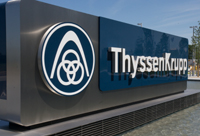 The problems with the launch of the new plant in Brazil will not let ThyssenKrupp go. Not only did the construction of the two new factories in Brazil and the U.S. State of Alabama end by swallowing up some ten billion euros, much more expensive than foreseen; the Essen steel giant now also has to make concessions to the environmental authorities for its Brazilian subsidiary CSA. In the Brazilian plant a dust extraction system for the cast-iron cooling pool and a second crane system have to be built, for about €45 million. In mid-February ThyssenKrupp submitted its quarterly report, and revised the outlook for the full year. The start-up and environmental problems in Brazil and the U.S. will mean a loss in EBIT in the fiscal year in the high hundreds of millions, and not as previously announced the middle hundreds. As the reason, the ThyssenKrupp chief named delayed commissioning of the coking plant, which meant expensive coking coal had to be purchased. In addition, the Brazilian plant produces less crude steel than planned, so that crude steel too had to be purchased externally. The bottom line is that the Thyssen management still expects an EBIT for the full year of two billion euros.
The problems with the launch of the new plant in Brazil will not let ThyssenKrupp go. Not only did the construction of the two new factories in Brazil and the U.S. State of Alabama end by swallowing up some ten billion euros, much more expensive than foreseen; the Essen steel giant now also has to make concessions to the environmental authorities for its Brazilian subsidiary CSA. In the Brazilian plant a dust extraction system for the cast-iron cooling pool and a second crane system have to be built, for about €45 million. In mid-February ThyssenKrupp submitted its quarterly report, and revised the outlook for the full year. The start-up and environmental problems in Brazil and the U.S. will mean a loss in EBIT in the fiscal year in the high hundreds of millions, and not as previously announced the middle hundreds. As the reason, the ThyssenKrupp chief named delayed commissioning of the coking plant, which meant expensive coking coal had to be purchased. In addition, the Brazilian plant produces less crude steel than planned, so that crude steel too had to be purchased externally. The bottom line is that the Thyssen management still expects an EBIT for the full year of two billion euros.
Puma corrected
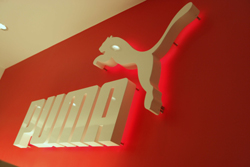 As sports-goods manufacturer Puma submitted its figures for fiscal year 2010 in mid-February and thus opened the reporting season, management had also to admit errors in financial statements for the years 2009 and earlier. In the Greek subsidiary Puma Hellas SA fraudulent acts were discovered, the statement said. This had led to errors in the consolidated statements as of 31 December 2009 and in previous years. The net equity in the financial statements for 2009 was too high by €106.5 million and consolidated net profit by €48.6 million. Earnings per share was consequently too high by €3.22. Assets were accounted for around €89.1 million euros too high and debt €17.4 million too low. In the Puma AG financial statements, claims against the subsidiary Puma Hellas would have to be adjusted downwards by €76.3 million. That meant PUMA AG's equity was set too high by this amount.
As sports-goods manufacturer Puma submitted its figures for fiscal year 2010 in mid-February and thus opened the reporting season, management had also to admit errors in financial statements for the years 2009 and earlier. In the Greek subsidiary Puma Hellas SA fraudulent acts were discovered, the statement said. This had led to errors in the consolidated statements as of 31 December 2009 and in previous years. The net equity in the financial statements for 2009 was too high by €106.5 million and consolidated net profit by €48.6 million. Earnings per share was consequently too high by €3.22. Assets were accounted for around €89.1 million euros too high and debt €17.4 million too low. In the Puma AG financial statements, claims against the subsidiary Puma Hellas would have to be adjusted downwards by €76.3 million. That meant PUMA AG's equity was set too high by this amount.
MAN in bribery troubles
 The corruption scandal at commercial vehicle manufacturer MAN is spreading. Its former subsidiary Ferrostaal is demanding €103 million back from the Essen commercial-vehicle manufacturers. This sum had been removed unlawfully by the then parent in 1999-2008 under the existing profit transfer and control agreement, argues the industry service provider. To get orders, the plant manufacturer had paid bribes for years, thus making profits that have now been exposed as illegal. Ferrostaal has corrected its accounts for the years in question because of the corruption scandal at the former parent. In the 2009 account, the company now lists the demand for €103 million. But as if that were not enough: in 2009 MAN had sold 70 percent of Ferrostaal to the Arab state fund IPIC. IPIC is now calling for a discount on the 30 percent of the Ferrostaal shares outstanding, and is even threatening rescission of the sale in the extreme case. There is also dispute as to who should pay the threatened fines on Ferrostaal. The Munich prosecutors have demanded €200 million if the investigations ongoing against the company since 2009 are to be suspended. The Ferrostaal problems have long been boiling up at MAN too: instead of presenting the annual report for 2010 on 1 March, the commercial-vehicle manufacturer will not publish its annual accounts until 21 March.
The corruption scandal at commercial vehicle manufacturer MAN is spreading. Its former subsidiary Ferrostaal is demanding €103 million back from the Essen commercial-vehicle manufacturers. This sum had been removed unlawfully by the then parent in 1999-2008 under the existing profit transfer and control agreement, argues the industry service provider. To get orders, the plant manufacturer had paid bribes for years, thus making profits that have now been exposed as illegal. Ferrostaal has corrected its accounts for the years in question because of the corruption scandal at the former parent. In the 2009 account, the company now lists the demand for €103 million. But as if that were not enough: in 2009 MAN had sold 70 percent of Ferrostaal to the Arab state fund IPIC. IPIC is now calling for a discount on the 30 percent of the Ferrostaal shares outstanding, and is even threatening rescission of the sale in the extreme case. There is also dispute as to who should pay the threatened fines on Ferrostaal. The Munich prosecutors have demanded €200 million if the investigations ongoing against the company since 2009 are to be suspended. The Ferrostaal problems have long been boiling up at MAN too: instead of presenting the annual report for 2010 on 1 March, the commercial-vehicle manufacturer will not publish its annual accounts until 21 March.
Hapag Lloyd to go public?
![]() For a long time tourism and shipping group TUI has been wanting to separate from its shipping subsidiary Hapag-Lloyd. In March 2009, the Hanoverians had thus passed 50.2 percent of the shares in the world's fifth-largest shipping company to the Albert Ballin consortium, which includes both logistics company Kuehne and the City of Hamburg. The search for a strategic investor continued meanwhile, but remained elusive. Now the economic environment is so good that a public offering of the Hamburg shipping line is scheduled for 15 April, writes the Financial Times Deutschland. It could become the largest German IPO since 2007. It is unclear what portion of the Hapag-Lloyd shares will be sold via the stock market. However, it is expected that TUI could dispose of 35 to 40 percent. The IPO could bring between one and one and a half billion euros. Hapag-Lloyd is valued at a total of three to three and a half billion euros. The TUI's supervisory board is to agree to the IPO on 3 March. Alternatively, the capital could be increased by 350 to 400 million euros, increasing the free float to 30 to 40 percent. A TUI spokesman told Financial Times Deutschland, however, that nothing had been decided yet. Meanwhile the HSH Nordbank, also part of the consortium, signalled it would be interested in selling off its three percent in a flotation.
For a long time tourism and shipping group TUI has been wanting to separate from its shipping subsidiary Hapag-Lloyd. In March 2009, the Hanoverians had thus passed 50.2 percent of the shares in the world's fifth-largest shipping company to the Albert Ballin consortium, which includes both logistics company Kuehne and the City of Hamburg. The search for a strategic investor continued meanwhile, but remained elusive. Now the economic environment is so good that a public offering of the Hamburg shipping line is scheduled for 15 April, writes the Financial Times Deutschland. It could become the largest German IPO since 2007. It is unclear what portion of the Hapag-Lloyd shares will be sold via the stock market. However, it is expected that TUI could dispose of 35 to 40 percent. The IPO could bring between one and one and a half billion euros. Hapag-Lloyd is valued at a total of three to three and a half billion euros. The TUI's supervisory board is to agree to the IPO on 3 March. Alternatively, the capital could be increased by 350 to 400 million euros, increasing the free float to 30 to 40 percent. A TUI spokesman told Financial Times Deutschland, however, that nothing had been decided yet. Meanwhile the HSH Nordbank, also part of the consortium, signalled it would be interested in selling off its three percent in a flotation.
Government still empty-handed
 The Committee of Experts set up by the federal government mid last year recommends that the federal government get rid as soon as possible of its silent partnership with Commerzbank. After the conversion of the silent partnership into shares the federal government should sell the entire stake to a strategic investor, the experts said in mid February. The weekly newspaper Die Zeit quoted the draft as saying the shares should be sold to an investor who would be willing to pay an additional cost for the check option. If the federal government converted its silent contributions of 16.4 billion euros, it would hold about 79 percent of the Frankfurt bank. Meanwhile Commerzbank CEO Martin Blessing announced that his institution will begin this year to repay the federal government's silent holdings. Initally 1.6 billion euros were under discussion. Also controversial are the bank's interest and bonus payments. For 2010, the Frankfurt institution will report earnings again, though not in the financial statement, which governs the servicing of the interest on the silent partnership. Here, a proposed billion write-down on real-esate financier Eurohypo will impinge negatively. Although the bank will pay no interest on the silent partnership in 2010 either, the employees are to receive a bonus for the past year in the low three-figure millions. The new compensation model had been agreed with the bank rescue fund SoFFin, a Commerzbank spokesman told the German Press Agency. A spokesman for Finance Minister Wolfgang Schäuble (CDU) also pointed out the legality of the bonus payments. The new bonus rules of the Bank Restructuring Act do not come in till 2011, the ministry said.
The Committee of Experts set up by the federal government mid last year recommends that the federal government get rid as soon as possible of its silent partnership with Commerzbank. After the conversion of the silent partnership into shares the federal government should sell the entire stake to a strategic investor, the experts said in mid February. The weekly newspaper Die Zeit quoted the draft as saying the shares should be sold to an investor who would be willing to pay an additional cost for the check option. If the federal government converted its silent contributions of 16.4 billion euros, it would hold about 79 percent of the Frankfurt bank. Meanwhile Commerzbank CEO Martin Blessing announced that his institution will begin this year to repay the federal government's silent holdings. Initally 1.6 billion euros were under discussion. Also controversial are the bank's interest and bonus payments. For 2010, the Frankfurt institution will report earnings again, though not in the financial statement, which governs the servicing of the interest on the silent partnership. Here, a proposed billion write-down on real-esate financier Eurohypo will impinge negatively. Although the bank will pay no interest on the silent partnership in 2010 either, the employees are to receive a bonus for the past year in the low three-figure millions. The new compensation model had been agreed with the bank rescue fund SoFFin, a Commerzbank spokesman told the German Press Agency. A spokesman for Finance Minister Wolfgang Schäuble (CDU) also pointed out the legality of the bonus payments. The new bonus rules of the Bank Restructuring Act do not come in till 2011, the ministry said.
Berlin wants to keep with EADS
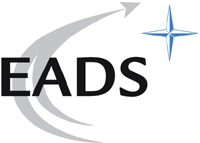 Daimler wants to withdraw from EADS. The Stuttgarters still directly hold 15 percent of the shares, but the German car manufacturer has 22.5 percent of the voting rights. On the French side Lagardère is involved with 15 percent and the State with 7.5 percent. The federal government had at its meeting on 23 February still not agreed on a common line for securing its longer-term influence on the ownership circle of the aerospace company. Particularly contentious is whether the German government, like the French, will play an active role as major shareholder. The coalition partners are, however, at least agreed that everything should be done to secure Franco-German balance. The Financial Times speculates that the politically and technologically sensitive parent company of aircraft manufacturer Airbus could itself buy the car company’s shares. Berlin then need not even buy the shares itself, but would still retain its influence.
Daimler wants to withdraw from EADS. The Stuttgarters still directly hold 15 percent of the shares, but the German car manufacturer has 22.5 percent of the voting rights. On the French side Lagardère is involved with 15 percent and the State with 7.5 percent. The federal government had at its meeting on 23 February still not agreed on a common line for securing its longer-term influence on the ownership circle of the aerospace company. Particularly contentious is whether the German government, like the French, will play an active role as major shareholder. The coalition partners are, however, at least agreed that everything should be done to secure Franco-German balance. The Financial Times speculates that the politically and technologically sensitive parent company of aircraft manufacturer Airbus could itself buy the car company’s shares. Berlin then need not even buy the shares itself, but would still retain its influence.
DSW against discharge at Hochtief
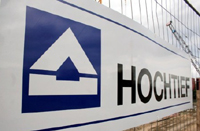 As Actividades de Construcción y Servicios (ACS) announced, after the end of the bid and acquisitions on the stock market, it currently held 33.49 percent of Hochtief. Hochtief's CEO Herbert Lütkestratkötter has now responded, and replaced the previously strict defence against the ACS attack by a dual strategy. He now wants to combine dialogue with ACS chief Florentino Pérez with a plan to increase the Essen MDAX company’s share price so much that the purchase is too expensive for the Spaniards. Lütkestratkötter referred in this context to the merger of subsidiaries into the new Hochtief Solutions and the planned concessions sale, in which investor interest is already high. In addition, hopes are placed in strong attendance at the next general meeting on 12 May, when the capital side of the Supervisory Board will be elected. Higher share prices would make it difficult for ACS to assert influence here already.
As Actividades de Construcción y Servicios (ACS) announced, after the end of the bid and acquisitions on the stock market, it currently held 33.49 percent of Hochtief. Hochtief's CEO Herbert Lütkestratkötter has now responded, and replaced the previously strict defence against the ACS attack by a dual strategy. He now wants to combine dialogue with ACS chief Florentino Pérez with a plan to increase the Essen MDAX company’s share price so much that the purchase is too expensive for the Spaniards. Lütkestratkötter referred in this context to the merger of subsidiaries into the new Hochtief Solutions and the planned concessions sale, in which investor interest is already high. In addition, hopes are placed in strong attendance at the next general meeting on 12 May, when the capital side of the Supervisory Board will be elected. Higher share prices would make it difficult for ACS to assert influence here already.
It could also get uncomfortable for Klaus Wiesehügel at the shareholder meeting. German shareholder association DSW will oppose discharge to the Hochtief supervisory-board member. DSW bases its position on a communication dated 16 February with an "apparently not agreed pushing by the IG-Bau [trade union] chief" in connection with the ACS offer. The union is said to have already held secret negotiations with the ACS-led group's top management before Christmas, while the Hochtief group was still opposing a takeover. The Works Council sees this approach as a betrayal.
Buhlmann's Corner
Quite presentable
 The Code Commission has decided that the Code is so good that it does not need to be adjusted. Although the criteria according to which one comes onto the Commission, and thereafter again leaves it, are not clear, and although the current Commission is poorly off in terms of biodiversity (which since last year the Code has even advocated), it is sure it has done a good job, and in late 2010, for the first time in 8 years, created a report on corporate governance status. When we compare it with the other CG cultures, then the Code is internationally quite presentable.
The Code Commission has decided that the Code is so good that it does not need to be adjusted. Although the criteria according to which one comes onto the Commission, and thereafter again leaves it, are not clear, and although the current Commission is poorly off in terms of biodiversity (which since last year the Code has even advocated), it is sure it has done a good job, and in late 2010, for the first time in 8 years, created a report on corporate governance status. When we compare it with the other CG cultures, then the Code is internationally quite presentable.
Example (1): In Japan, general meetings are often held on a massive scale on a single “annual shareholders’ meeting day”, so that individual shareholders interfere less. This practice appears to be quite a taste in Germany too. On 26 May there are at least sixteen national dates on offer, and on 12 May at least twelve, every second one of them a DAX heavyweight. If this is intentional, then shareholders should as a punishment sometimes react with contempt ... maybe starting with Hochtief. If not, then I wonder why the Supervisory Board members do not sometimes look at more than their own diaries before the decisions. The concentrations of dates maybe made more sense when a single Supervisory Board member might hold 10 or more appointments (Hermann Josef Abs’s 30 are legendary) at the same time.
Example (2): For over 100 years – so even before the Code Commission – in Germany, supervisory boards have been elected by shareholders. A German can hardly imagine it otherwise. Even at Infineon, we now, after the voting interpretation from the year 2010 – when half the AGM votes were reinterpreted – see a change in the Supervisory Board Presidency implemented following the shareholders’ request, making the commitment of Dr. Hans Hirt at HERMES a success. Things are different in the motherland of corporate governance, as 23 February 2011 clearly showed. A single shareholder at the Apple Inc Annual General Meeting put the motion that shareholders should in future choose the Board members, and this request was accepted by 75.1% (German counting, no abstentions) of the shares.
ACTIONS CORNER
 In the dispute with QVT over unpaid interest on participation certificates, Eurohypo has sustained a bitter defeat in Frankfurt District Court. The court ruled that the real-estate finance company has to pay interest for 2009 on those participating certificates still being serviced in 2008 in spite of losses, even if the payment creates a further loss. In addition, the Commerzbank subsidiary should not, in the opinion of the Court, make the holders of certain participation rights participate in losses by reducing the face value of the paper. The District Court thus accepted the U.S. hedge fund’s suit against the bank, on 15 February.
In the dispute with QVT over unpaid interest on participation certificates, Eurohypo has sustained a bitter defeat in Frankfurt District Court. The court ruled that the real-estate finance company has to pay interest for 2009 on those participating certificates still being serviced in 2008 in spite of losses, even if the payment creates a further loss. In addition, the Commerzbank subsidiary should not, in the opinion of the Court, make the holders of certain participation rights participate in losses by reducing the face value of the paper. The District Court thus accepted the U.S. hedge fund’s suit against the bank, on 15 February.
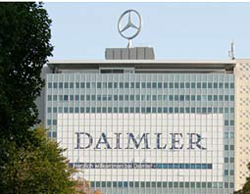 Daimler has been incriminated by Paris judicial authorities in a case of insider trading in EADS shares already decided in favour of the Stuttgart group. The proceedings had been regarded as already complete. In the midst of discussion about Daimler's future role in the aerospace group, French public prosecutors are now officially investigating the former witness. The proceedings for insider trading, in which EADS's major private shareholders, Daimler and Legardère, have now been inculpated, are about the accusations that the automaker sold 7.5 percent of its units in both 2006 and 2007 using its knowledge of technical difficulties with the A 380.
Daimler has been incriminated by Paris judicial authorities in a case of insider trading in EADS shares already decided in favour of the Stuttgart group. The proceedings had been regarded as already complete. In the midst of discussion about Daimler's future role in the aerospace group, French public prosecutors are now officially investigating the former witness. The proceedings for insider trading, in which EADS's major private shareholders, Daimler and Legardère, have now been inculpated, are about the accusations that the automaker sold 7.5 percent of its units in both 2006 and 2007 using its knowledge of technical difficulties with the A 380.
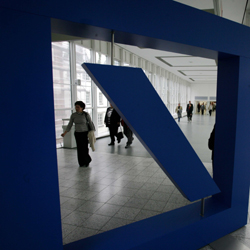 On 8 February Ulrich Wiechers indicated during the trial of an action by Ille GmbH that the Deutsche Bank had according to his assessment breached its duty of care in the distribution of spread-ladder swaps. The presiding judge of the Federal Court also criticized that the bank’s complex interest-rate products did not fit the role it aspired to, of being the preferred partner of the middle class. The court adjourned its decision to 22 March. According to industry estimates, the institution has sold the interest-rate swap products to a three-digit number of companies.
On 8 February Ulrich Wiechers indicated during the trial of an action by Ille GmbH that the Deutsche Bank had according to his assessment breached its duty of care in the distribution of spread-ladder swaps. The presiding judge of the Federal Court also criticized that the bank’s complex interest-rate products did not fit the role it aspired to, of being the preferred partner of the middle class. The court adjourned its decision to 22 March. According to industry estimates, the institution has sold the interest-rate swap products to a three-digit number of companies.
Leo Kirch’s action for damages against Deutsche Bank has failed in Munich I Regional Court. Judge Brigitte Pecher threw out the so-called ‘Print-Klage’ in all respects. The Kirch Group had according to the Munich court suffered no damage attributable to the Bank through the interview with Rolf Breuer in February 2002 in which, a few months before the bankruptcy, he questioned the credit rating of the nested group. The media tycoon claims the then Deutsche Bank CEO was responsible for the failure and is calling for 1.3 billion euros in damages. Together with other cases, the total concerned is 3.5 billion euros.
The Deutsche Bank has been excluded from proprietary trading in equities and derivatives in South Korea for six months due to unfair trading practices. The South Korean Financial Services Commission FSC claims the Bank is responsible for a crash on the Seoul stock exchange on 11 November 2010 that wiped out 26 billion dollars in stock-market value. Its subsidiary DSK had achieved €29 million in "unfair" trading profits and should therefore suspend trade from April to September, the Seoul financial watchdogs said on 23 February. Investigations continue against five employees.
Fresenius has lost on appeal too, in the action for avoidance of decisions of the 2009 AGM. The Frankfurt Higher Regional Court found partly in favour of Gabriele Kröner, and annulled discharge to the Board and Supervisory Board of the health group for the business year 2008. The plaintiff had challenged the discharge decisions, carried overwhelmingly. Kröner, former Supervisory Board member and daughter of the former board chairman, had also taken action with five other shareholders against the merger of preferred and common stock, and had agreed a settlement with Fresenius in late January.
 SAP on 23 February called on the District Court in Oakland, California to reduce the penalties imposed, from 1.3 billion dollars to a maximum of $ 408,700,000. In November 2010 a jury of the Court had found the the German software group guilty of large-scale theft of data from the competition. In a second application, the Walldorf group is seeking a completely new trial, should the amount of compensation, which is in the lawyers’ opinion based on pure speculation, not be reduced to the degree required. Judge Phyllis Hamilton will decide at a hearing on 13 July.
SAP on 23 February called on the District Court in Oakland, California to reduce the penalties imposed, from 1.3 billion dollars to a maximum of $ 408,700,000. In November 2010 a jury of the Court had found the the German software group guilty of large-scale theft of data from the competition. In a second application, the Walldorf group is seeking a completely new trial, should the amount of compensation, which is in the lawyers’ opinion based on pure speculation, not be reduced to the degree required. Judge Phyllis Hamilton will decide at a hearing on 13 July.
 The corruption trial of Thomas Ganswindt for tax evasion and abetting by omission begins on 5 April, with three professional judges. The start of the proceedings at the end of January was interrupted after 15 minutes because the defenders had criticized the composition of the criminal division at the Munich district court with only two professional judges as understaffed given the complex and burdensome process. The prosecution alleges that the former Siemens Board member had as chief of the former telecom division intentionally violated his duty of supervision because he had condoned slush funds from 2001, though references to bribes for contracts abroad had been submitted to him.
The corruption trial of Thomas Ganswindt for tax evasion and abetting by omission begins on 5 April, with three professional judges. The start of the proceedings at the end of January was interrupted after 15 minutes because the defenders had criticized the composition of the criminal division at the Munich district court with only two professional judges as understaffed given the complex and burdensome process. The prosecution alleges that the former Siemens Board member had as chief of the former telecom division intentionally violated his duty of supervision because he had condoned slush funds from 2001, though references to bribes for contracts abroad had been submitted to him.
AGM Dates
| Company | Event | Date | Time | Place | Address | Published on |
| DAX | ||||||
| Henkel | ord.AGM | 11.04.2011 | 10:00 | 40474 Düsseldorf | Rotterdamer Str. 141. CCD Stadthalle | 24.02.2011 |
| The Agenda for the ordinary AGM of Henkel AG & Co. KGaA starts with the usual items, like presentation of annual accounts and discharge to the company bodies. Henkel AG & Co. KGaA earned balance-sheet profits of €861.53m last business year. Of the profits, €310.14m is to be paid out as dividend, €250.0m allocated to reserves and €301.39m carried forward to a new account. Dr. Norbert Reithofer is to be elected a member of the Shareholders' Committee. A resolution consenting to the amendment of control and profit-transfer agreements between Henkel AG & Co. KGaA and subsidiaries is to be taken. | ||||||
| Merck | ord.AGM | 08.04.2011 | 10:00 | 65931 Frankfurt am Main | Pfaffenwiese, Jahrhunderthalle | 24.02.2011 |
| The Agenda for the ordinary AGM of Merck KGaA starts with the usual items, like presentation of annual accounts and discharge to the company bodies. Merck KGaA earned balance-sheet profits of €203.17m last business year. Of the profits, €80.78m is to be paid out as dividend and €122.4m carried forward to a new account. A resolution approving the board members’ pay system is to be taken. | ||||||
| MDAX | ||||||
| DOUGLAS | ord.AGM | 23.03.2011 | 10:30 | 58093 Hagen | Wasserloses | 04.02.2011 |
| The Agenda for the ordinary AGM of DOUGLAS HOLDING AG starts with the usual items, like presentation of annual accounts and discharge to the company bodies. DOUGLAS HOLDING AG earned balance-sheet profits of €44.0m last business year. Of the profits, €43.31m is to be paid out as dividend and €0.69m carried forward to a new account. A resolution approving the board members’ pay system is to be taken. Elections and re-elections to the supervisory board are to be held. | ||||||
| Aurubis | ord.AGM | 03.03.2011 | 10:00 | 20355 Hamburg | Marseiller Straße 2, CCH Congress Center Hamburg | 20.01.2011 |
| The Agenda for the ordinary AGM of Aurubis AG starts with the usual items, like presentation of annual accounts and discharge to the company bodies. Aurubis AG earned balance-sheet profits of €84.48m last business year. Of the profits, €44.96m is to be paid out as dividend and €39.53m carried forward to a new account. The company is again to be authorized to purchase its own shares and use them, possibly excluding shareholders’ subscription and tendering rights. | ||||||
Politics
Lax sanctions against sneaking-up
The examples of Schaeffler and Continental, as well as Porsche and Volkswagen, produced calls for tougher laws on the so-called sneak-up in planned takeovers. In mid February, the Bundestag has now adopted the amendment to the Investor Protection Act. This provides that any future incidents will be subject to a fine of one million euros. The opposition condemned it as too lax. Large companies especially would not be deterred by this small penalty. Even the coalition partner FDP admitted that it was not a perfect solution. As late as January, the conservative-liberal government had discussed the withdrawal of voting rights as punishment for such an offence, but rejected it after concerns by the Federal Treasury and the Federal Financial Supervisory Authority (BaFin). Investors still have to disclose if they have purchased five percent of the shares in a company, as well as other increases by five percent. According to the new law options and swaps on shares must then also be reported. For the summer, the word is a second round is on the way: a search for a more effective solution.
New Bank Stress Test
 91 European banks were tested in the first stress test in July 2010. Seven, including the German Hypo Real Estate, fell through. Nevertheless, this first test was considered too lax and not credible: after all, the Irish banks that collapsed a short time later were not on the penalty list. Now the European banks are again, in a second, more credible stress test in March and April, to show how stable they are. EU Internal Market Commissioner Michel Barnier even advocated repeating the test on a regular basis and publishing the results. The national watchdogs are consulting with the new European banking authority EBA on the details of the new test until 2 March. The results will then be available in summer. The EBA is also to ensure that the new parameters are applied uniformly in all participating countries and that the countries monitor each other at the same time. Open until now is whether in addition to the credit risks liquidity risks are also to be included in the test. Thus, not just the government bonds held in the trading book could be tested, but also the banking book holding papers with maturity, where potential hidden liabilities lurk. The EBA has proposed as a compromise to analyse the liquidity in parallel with but separately from the stress test and to discuss the results only internally. While the Federal Association of German Banks (BdB) welcomes the liquidity test, Federal Finance Minister Wolfgang Schäuble (CDU) and Bundesbank President Axel Weber fear too high transparency in the publication of the results might cause more damage than any benefit to be achieved.
91 European banks were tested in the first stress test in July 2010. Seven, including the German Hypo Real Estate, fell through. Nevertheless, this first test was considered too lax and not credible: after all, the Irish banks that collapsed a short time later were not on the penalty list. Now the European banks are again, in a second, more credible stress test in March and April, to show how stable they are. EU Internal Market Commissioner Michel Barnier even advocated repeating the test on a regular basis and publishing the results. The national watchdogs are consulting with the new European banking authority EBA on the details of the new test until 2 March. The results will then be available in summer. The EBA is also to ensure that the new parameters are applied uniformly in all participating countries and that the countries monitor each other at the same time. Open until now is whether in addition to the credit risks liquidity risks are also to be included in the test. Thus, not just the government bonds held in the trading book could be tested, but also the banking book holding papers with maturity, where potential hidden liabilities lurk. The EBA has proposed as a compromise to analyse the liquidity in parallel with but separately from the stress test and to discuss the results only internally. While the Federal Association of German Banks (BdB) welcomes the liquidity test, Federal Finance Minister Wolfgang Schäuble (CDU) and Bundesbank President Axel Weber fear too high transparency in the publication of the results might cause more damage than any benefit to be achieved.
Weber throws in the towel
Bundesbank President Axel Weber resigned on 30 April 2011, one year before the expiry of his contract. He is to be succeeded by the 42-year-old Jens Weidmann, one of the closest economic advisers to Federal Chancellor Angela Merkel, and as executive secretary the architect of the measures to curb the financial crisis. Weidmann previously worked for the Bundesbank as head of monetary policy and monetary analysis, then worked for the International Monetary Fund and as Secretary-General of the Federal Government’s Council of Experts. His deputy is to be Sabine Lautenschlager, currently at the Federal Financial Supervisory Authority (BaFin) as Executive Director.
Axel Weber was the first contender to succeed Jean-Claude Trichet at the head of the ECB. With Weber’s departure hopes for a German ECB chairmanship seem to have been put off indefinitely.
People
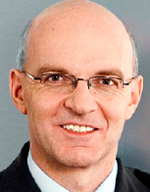 Klaus Stahlmann left MAN on 22 February at his own request, said the Munich commercial vehicle and engine manufacturer. The background is supposedly an ongoing investigation in the corruption scandal, in which the head of MAN subsidiary Diesel & Turbo is a suspect in relation to bribery and other charges, confirmed a spokeswoman for the Munich public prosecutors.
Klaus Stahlmann left MAN on 22 February at his own request, said the Munich commercial vehicle and engine manufacturer. The background is supposedly an ongoing investigation in the corruption scandal, in which the head of MAN subsidiary Diesel & Turbo is a suspect in relation to bribery and other charges, confirmed a spokeswoman for the Munich public prosecutors.
Dave Lemus is leaving MorphoSys in March in order to pursue other opportunities. The biotechnology company announced on 24 February that Jens Holstein has been appointed as new CFO and member of the Executive Board as of 1 May. The move was set up last fall and had nothing to do with the withdrawal of the earnings forecast in January, said a company spokeswoman.
Wolfgang Wehmeyer has been appointed by the Amtsgericht Mannheim, at the request of the Board, to the Supervisory Board of STRATEC Biomedical Systems. The Court is thus following a company recommendation. The court order was made necessary after Robert Siegle resigned from the Supervisory Board on 31 December 2010 to join the board.
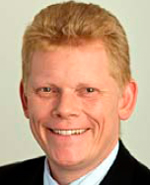 Guido Kerkhoff, board member of Deutsche Telekom, is to succeed Alan Hippe as CFO at ThyssenKrupp. Both DAX groups announced this on 14 February. Kerkhoff is to reduce the steel group’s debt. The 43-year-old is to follow incumbent Hippe at the earliest possible date. The Supervisory Board of Telekom must still approve the contract termination.
Guido Kerkhoff, board member of Deutsche Telekom, is to succeed Alan Hippe as CFO at ThyssenKrupp. Both DAX groups announced this on 14 February. Kerkhoff is to reduce the steel group’s debt. The 43-year-old is to follow incumbent Hippe at the earliest possible date. The Supervisory Board of Telekom must still approve the contract termination.
Campus
Forecasts important again
Which figures are analysts specially looking at? How should indicators be selected and how communicated? How are too-pessimistic forecasts to be included? These are questions that consulting firm cometis asked in December in a poll of sell- and buy-side analysts. It became clear that a forecast should, ideally, include sales, EBIT and EBITDA. However, management should explain why a particular measure is used and others not. With exact data, analysts want a range instead of a precise or even a minimum value. These margins may fluctuate by up to 20 percent. If too-pessimistic forecasts are given, a company is setting its credibility at stake, say the analysts. Accordingly, the goals should be realistic and ambitious and reflect market value as well as the company’s potential. Participants in the study said the lowest transparency was in the guidance sector in banks, property companies and financial services in general.
Good atmosphere on the exchange
 Each quarter, the consulting firm cometis interviews leaders from the issuing sector of renowned German and foreign banks about their current views of the capital market in Germany. In the latest survey, the 24 experts surveyed indicated on the record that like overall economic development, the mood was better again. While the German stock market particularly inspired the imagination of participants and 68 percent advise the purchase of German shares, they also expect some positive momentum from the stock exchanges in Europe, Japan and the U.S. In highest favour the technology sector stands undisputed, followed by industry, commerce and chemicals. Companies from the financial sector, i.e. banking and insurance, benefited little from the positive mood and ended up relegated to last place. The DAX, the most important indicator of developments on the German capital market, is expected by the bankers surveyed to be at 7415 points on average at the year’s end. While half of the experts expect five to ten IPOs in 2011, the remaining 50 per cent regard ten to 25 as possible. The experts see the biggest danger for the German stock market as the euro crisis or the indebtedness of the PIIGS States.
Each quarter, the consulting firm cometis interviews leaders from the issuing sector of renowned German and foreign banks about their current views of the capital market in Germany. In the latest survey, the 24 experts surveyed indicated on the record that like overall economic development, the mood was better again. While the German stock market particularly inspired the imagination of participants and 68 percent advise the purchase of German shares, they also expect some positive momentum from the stock exchanges in Europe, Japan and the U.S. In highest favour the technology sector stands undisputed, followed by industry, commerce and chemicals. Companies from the financial sector, i.e. banking and insurance, benefited little from the positive mood and ended up relegated to last place. The DAX, the most important indicator of developments on the German capital market, is expected by the bankers surveyed to be at 7415 points on average at the year’s end. While half of the experts expect five to ten IPOs in 2011, the remaining 50 per cent regard ten to 25 as possible. The experts see the biggest danger for the German stock market as the euro crisis or the indebtedness of the PIIGS States.
Low female ratio
 The FidAR (Women onto Supervisory Boards) campaign has published its first Women on Board Index (WoB). In the course of a survey of the 160 companies in the DAX, MDAX, TecDAX and SDAX, FidAR found a women's quota on the boards of 6.5 percent. At almost 17.7 percent, the female ratio on the employee side was comparatively high, but stockholders sent only three percent of women onto the bodies. "A male share of 93.5 percent on management and supervisory boards is no longer acceptable," said FidAR President Monika Schulz-Strelow. CG-Commission member Manfred Gentz, however, warned against political initiatives. Since supervisory boards are usually appointed for five years and 2011 was not a target date for board elections, changes would take time, he argued. Realistically, they are likely only after one to two terms, in 2016 or 2017, according to Gentz. Among the pioneers in the women's quota, in addition to Deutsche Telekom which will have women occupying some 30 percent of the upper and middle management positions by late 2015, is now also Merck. The Darmstadt-based company plans to increase the proportion of women in management positions by 2016 to 25 to 30 percent. Currently Douglas, Deutz and GfK shine as role models. There, the proportion of women in senior positions is between 30 and 40 percent. FidAR will now present the WoB index regularly.
The FidAR (Women onto Supervisory Boards) campaign has published its first Women on Board Index (WoB). In the course of a survey of the 160 companies in the DAX, MDAX, TecDAX and SDAX, FidAR found a women's quota on the boards of 6.5 percent. At almost 17.7 percent, the female ratio on the employee side was comparatively high, but stockholders sent only three percent of women onto the bodies. "A male share of 93.5 percent on management and supervisory boards is no longer acceptable," said FidAR President Monika Schulz-Strelow. CG-Commission member Manfred Gentz, however, warned against political initiatives. Since supervisory boards are usually appointed for five years and 2011 was not a target date for board elections, changes would take time, he argued. Realistically, they are likely only after one to two terms, in 2016 or 2017, according to Gentz. Among the pioneers in the women's quota, in addition to Deutsche Telekom which will have women occupying some 30 percent of the upper and middle management positions by late 2015, is now also Merck. The Darmstadt-based company plans to increase the proportion of women in management positions by 2016 to 25 to 30 percent. Currently Douglas, Deutz and GfK shine as role models. There, the proportion of women in senior positions is between 30 and 40 percent. FidAR will now present the WoB index regularly.
High proportion of funds
In 2010 the Association of German Banks (BdB) counted 27 million private investment accounts. This means one in three Germans has such an account. The value of the securities in them added up to 783 billion euros. €387 billion, or about half that amount, was in investment funds. Some €224 billion are held in the form of bonds and a further €172 billion in shares. Stocks thus form only one fifth of the total investment amount. Adding insurers, businesses and the State, the banking industry takes care of securities worth two trillion euros for domestic customers.
Capital News
Conergy will be able to implement its plans for a refinancing. At an extraordinary general meeting on 25 February in Hamburg, 99.5 percent of shareholders voted in each case for substantial debt relief measures, said the troubled Hamburg photovoltaic company. These will see a capital writedown in an eight to one ratio and a subsequent capital increase. The capital stock will first be reduced from €398,088,928 to €49,761,116. Through the capital increase, Conergy wants to take in €188m, in order to cut debt to €135 million and so reduce the interest burden considerably.
IVG Immobilien has increased its share capital by issuing up to 12,599,999 new shares. They were placed with investors through an accelerated procedure in. The Bonn real estate group announced this on 11 February after market close. The package was worth € 87m. The MDAX-listed company will use about two-thirds of the proceeds for the restructuring and the associated extension of bank loans. With the remaining money, the Squaire Parking project at Frankfurt Airport is to be further boosted.
Rupert Murdoch is supporting Sky Deutschland’s investment in programme expansion. News Corporation is to commit to a shareholder loan of around 48 million euros to the pay-TV channel for the development of sports programmes,. The loan is secondary to the existing lines of credit and will run until 31 March 2014. The annual interest rate is twelve percent; the interest is due only at the end of the term. The new high-definition channel called "Sky Sports News HD" is to go on the air in Austria and Germany by winter and then be broadcast live around the clock.
Director's Dealings
in February
| Person | Function | Buy / Sell | Total value in Euro | Number of shares | Datum |
| Helmut Wirtz | SB | B | 40.470 | 1.000 | 14.02.2011 |
| Jürgen Buchsteiner | MB | B | 98.300 | 2.000 | 26.05.2010 |
| CoCo Beteiligung | S | 1.113.025 | 2.647.226 | 31.01.-18.02.2011 | |
| Seth Harisson Waugh | S | 2.099.955 | 33.544 | 04.02.2011 | |
| Alexander von zur Mühlen | S | 33.420 | 04.02.2011 | ||
| AROSA Vermögensverwaltung | S | 9.339.273 | 345.899 | 17.02.2011 | |
| AROSA Vermögensverwaltung | B | 13.500.000 | 500.000 | 10.02.2011 | |
| Prof. Dr. Henning Kagermann | SB | B | 98.718 | 7.326 | 18.08.2010 |
| Gregorio Reyes | SB | S | 751.670 | 50.000 | 22.02.2011 |
| Gwyneth Austin | 87.356 | 5.996 | 17.-22.02.2011 | ||
| Andrew Austin | MB | B | 87.772 | 5.719 | 17.02.2011 |
| Hans Joachim Oltersdorf | SB | B | 134.180 | 2.000 | 26.01.2011 |
| William Joseph Brennan | MB | S | 4.661.250 | 621.500 | 03.02.2011 |
| CCC Investment GmbH | S | 9.812.500 | 315.000 | 25.01.-21.02.2011 | |
| Matthias Zachert | MB | S | 584.416 | 11.013 | 31.01.2011 |
| Dominik Probst | B | 92.599 | 3.000 | 31.01.2011 | |
| Dieter Maier | SB | S | 61.400 | 10.000 | 15.02.2011 |
| BAKER COMMUNICATIONS FUND (Cayman) | Payout | 0 | 4.181.714 | 01.02.2011 | |
| Baker Capital Partners II (Anguilla) | Payout | 0 | 41.818 | 01.02.2011 | |
| Baker Capital Partners | Payout | 0 | 41.816 | 01.02.2011 | |
| Baker Communications Fund II | Payout | 0 | 4.181.674 | 01.02.2011 | |
| Baker QSC Coinvestor | Payout | 0 | 1.276.119 | 01.02.2011 | |
| Toni Wicki | SB | B | 5.407 | 100 | 09.12.2010 |
| Werner Brandt | MB | B | 4.545.000 | 120.000 | 15.02.2011 |
| Werner Brandt | MB | S | 5.290.248 | 120.000 | 15.02.2011 |
| Joachim Hechler | S | 1.058.050 | 24.000 | 15.02.2011 | |
| Joachim Hechler | B | 909.000 | 24.000 | 15.02.2011 | |
| Dr. Norbert Schiedeck | MB-Head | B | 48.000 | 30.000 | 28.01.2011 |
VIPsight Shareholders
in February
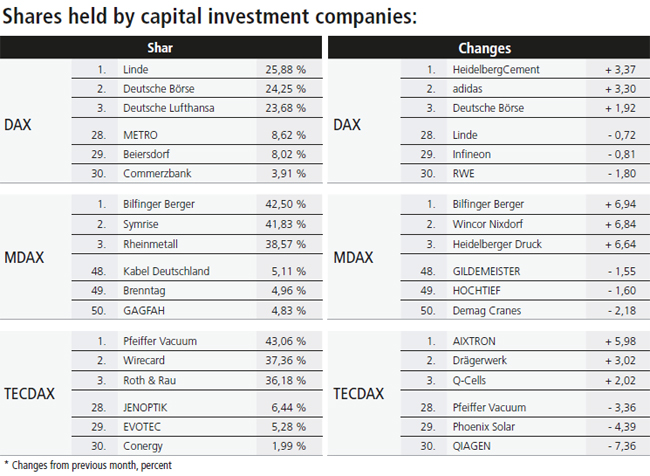
VIPsight Shareholder ID <click here>
Event Diary
15 March 2011 Sonderinsolvenzrecht für Banken – das neue Restrukturierungsgesetz [special insolvency law for banks - the new restructuring law]
Organizer: DAI; place: DVFA-Center im Signaris, Mainzer Landstrasse 37-39, Frankfurt am Main; cost: €900, info: 069 2915-0
22 March 2011 Investor Relations vor neuen Herausforderungen – Social Media, Online-Hauptversammlung und CSR-Reporting [Investor Relations facing new challenges - social media, online meetings and CSR reporting]
Organizer: DAI; place: Hotel Hessischer Hof, Friedrich-Ebert-Anlage 40, Frankfurt am Main; cost: €900, info: 069 2915-0
Reading suggestions
Butzke, Volker, Die Hauptversammlung der Aktiengesellschaft [The AGM]
Schäffer-Poeschel Verlag, 5th ed., 621 pp, €129.95, ISBN 978-3-7910-2588-9
This work is essential for those who are preparing for general meetings, or implement and manage or participate in them as a member of the board of directors or supervisory board or as shareholders or shareholder representatives. On the basis of the legal framework conditions, typical questions are addressed. Particular attention is paid to the rights and duties of the chairman in conflict situations as well as to shareholder rights to speech and to be informed. The new edition includes the Corporate Governance Code and the numerous legislative changes and current case law. A separate chapter is devoted to the general meeting of the SE.
CMS Hasche Sigle (ed.), Rechtsratgeber Übernahmerecht [The Legal Advisor on Takeover Law]
Cometis, 184 pp, €19.90, ISBN 978-3-940828-73-6
This handy pocket-sized work is a concise and catchily written overview of the key practical legal issues relating to the acquisition of listed companies and is a collaborative work written by the takeover-specialist partners in the law firm CMS Hasche Sigle. It is written by practitioners for practitioners and informs in the shortest form about the market for public takeovers in Germany, due diligence, the bid phase and the duties of the governing bodies of the target company, up to the "hostile takeover" and legal protection. The guide is completed by a time and action plan, the contents of an offer document and a glossary.
Dehnen, Peter H., Der professionelle Aufsichtsrat [The Professional Supervisory Board Member]
F.A.Z.-Buch, 224 pp, €29.90. ISBN 978-3-8998-1255-8
The demands on the supervisory board member have changed considerably in recent years. This book shows the main functions of the Supervisory Board up to date and how they are ideally to be performed. The basic knowledge on all relevant issues such as corporate governance, rights and responsibilities, budgets, bankruptcy, value management and communication is clearly taught in a practical way - with many examples from "real" life. But topics such as rhetoric and professional appearance to the outside are also treated.
Heese, Victor, Aktienbewertung mit Kennzahlen [Stock Valuation Metrics]
Gabler Verlag, 220 pp, €34,95. ISBN 978-3-8349-1675-4
The book provides a clear, concise and critical survey of the most commonly used indicators in the fundamental analysis of stocks. The central question: when is a normal assessment present and when over- or under-valuation of individual stocks or the total market? In the first part the author defines and explores the key figures in question, before then in the second part examining how many and which metrics promise good investment success.
Horn, Georg, Schroffenberg, Hubertus von, Ganzheitliche Finanzplanung [Holistic Financial Planning]
Gabler Verlag, 240 pp, €39.95, ISB 978-3-8349-2694-4
The importance of behavioural finance, the research branch that deals with the influence of psychological mechanisms on economic action, is hardly disputed. The literature has so far dealt with this issue more at the scientific level. In this book two practitioners from the insurance industry link expertise and psychology to mature and proven consulting concepts. These include both the investment of funds (primarily for retirement, but also for other purposes) as well as borrowing. They take into account the needs of decidedly critical audiences, such as from mid-sized companies, heirs, women, or the so-called Best Agers.
Rapp, Matthias, Wullenkord, Axel, Unternehmenssteuerung durch den Finanzvorstand [Corporate Management by the Chief Financial Officer]
Gabler Verlag, 208 pp, €44,95, ISBN 978-3-8349-2569-5
The CFO takes a prominent position on the board in many companies, as his responsibilities are crucial for the preservation and development of the company. The authors describe the central aspects of this range of tasks, going well beyond the compilation and preparation of figures, in an impressive and practice-orientied manner.















